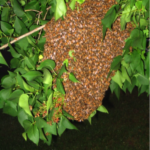SWARMS
Honey Bees or Wasps?
Did a swarm of honey bees just land in a tree near your home?
Do you have a colony of honey bees living in the siding of your home?
Do you have a wasp nest in the ground, or hanging on the eaves of your house?
With reason, many people confuse yellow jacket wasps, hornet wasps, and honey bees.
Beekeepers do not remove wasp nests or yellow jacket nests from structures.
Our advice is: if they are not bothering you, enjoy them, or at least ignore them, for our short summer season; the pesky wasps will be dead after two hard frosts.
Did a swarm of honey bees just land in a tree near your home?
Do you have a colony of honey bees living in the siding of your home?
Do you have a wasp nest in the ground, or hanging on the eaves of your house?
With reason, many people confuse yellow jacket wasps, hornet wasps, and honey bees.
Beekeepers do not remove wasp nests or yellow jacket nests from structures.
 Our local beekeepers are equipped to rescue swarms of honey bees from your yard. Call a beekeeper, as soon as you see the swarm of honey bees. Within the first few hours the swarms do not fly as high.
Our local beekeepers are equipped to rescue swarms of honey bees from your yard. Call a beekeeper, as soon as you see the swarm of honey bees. Within the first few hours the swarms do not fly as high.
Do not spray or kill the honey bees. They are animals that swarmed from someone’s hive of honey bees just like a farmer’s cows or pigs get out. The difference is that they fly and cannot be contained by fences. Killing honey bees is inhumane just like killing someone’s horse or dog. We depend on the pollination of plants by honey bees for our food supply such as fruits and other food crops
To report a swarm: Call (304) 372-3106 (304) 377-5702; (304) 895-3430; or (304) 372-1883. Our officers will try to locate a member beekeeper to rescue the swarm of honey bees. Honey bee swarms are not dangerous, but they do need to find an appropriate home so they do not take up residence in the walls or ceilings of someone’s home. Beekeepers can help by collecting the swarm. If you see a swarm of honey bees, it’s important to report it as soon as possible. Call the phone number above and we will try to find a beekeeper who can remove them.
Be prepared to provide the following information when you call.
- How long has the swarm been there?
- Where are they located, such as 5 feet up a tree at xxx Street, City.
- What is your name and phone number?
- Can you take a photo of a bee or swarm as close-up as you feel comfortable?
Our members can only help with honey bees.
If you’re unsure whether or not the swarm is honey bees, refer to the pictures on this page. These are honey bees in the photo below:

It’s best to leave the swarm alone.
Do not spray a swarm with insecticide
or water.
How long will the swarm stay in my bush, tree or post?
Usually from an hour to sometimes1 day. It really depends on when the scout bees find a suitable location for a new home, and the weather. Beekeepers will try to rescue them before they move to an unreachable height or move into your home, a garage building, vehicle, barrel, etc.
Honey Bees swarm for different reasons. The main reason is to reproduce another colony especially during the months of April, May and June, but often they die trying to find another home. During late summer and fall they will swarm due to starvation or a problem, but are unlikely to survive the winter unless the beekeeper hives them and feeds them heavily.
We need bees worse than they need us. As Albert Einstein stated: “Once the honey bees are gone, mankind will have 4 years left”… They are the primary pollinators of most of the fruit and vegetables we eat.
Make sure you are seeing honey bees and not yellow jackets. Here is a photo of what swarms look like:

If honey bees have taken up residence in your home, there are professionals that can remove them, but often it involves some major destruction and reconstruction of your home or building.
It is best to call so a swarm can be rescued before they decide to make a home inside your home.
